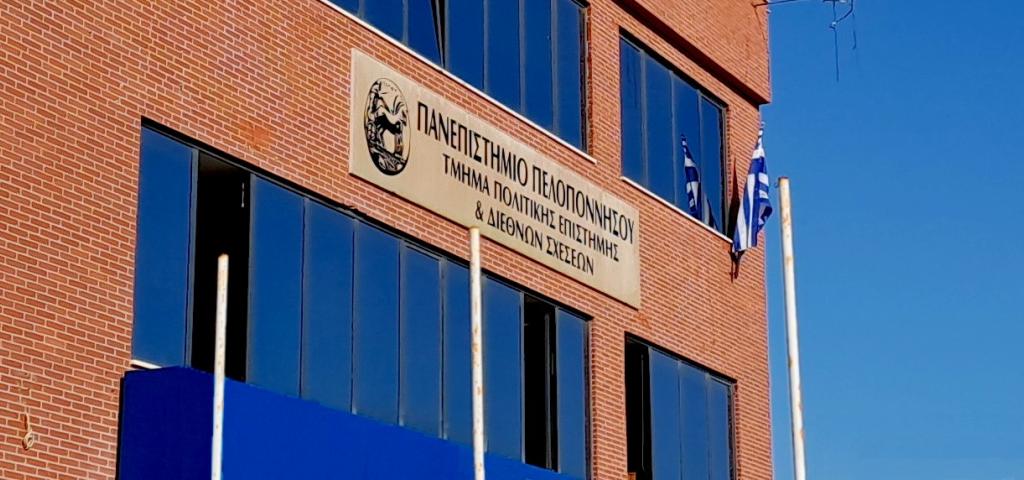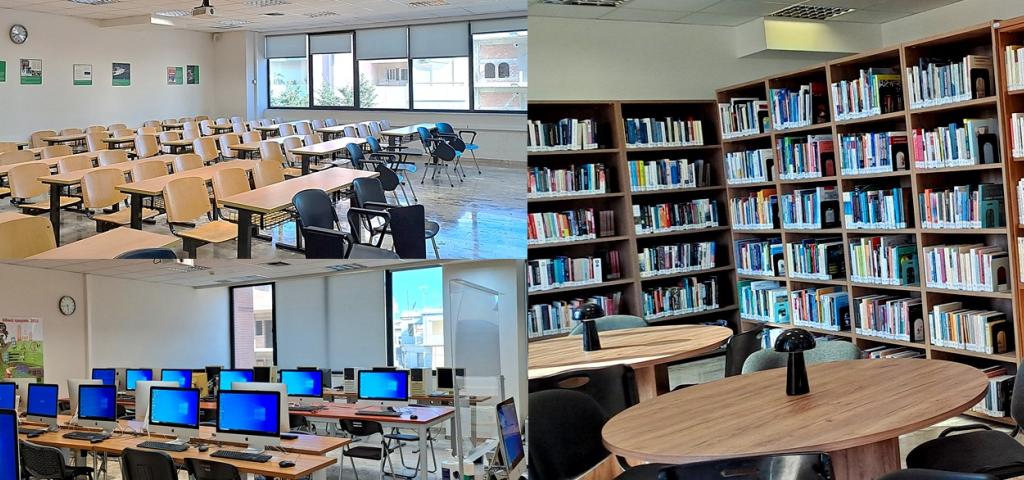

- Where is the Department of Political Science and International Relations?
-
The Department of Political Science and International Relations is located at the intersection of 1, Aristotelous street and Athens Avenue in Corinth, on the 1st floor.
- Where can I see the Curriculum?
-
The Curriculum is available on the website of PEDIS in the field of Studies → Undergraduate Studies →Study Guide Structure
- What is a Study Advisor?
-
The Department of Political Science and International Relations offers academic advising support. Each student has the opportunity to contact the Student Advisor who has been assigned, in order to be informed about issues related to the Curriculum, the choice of courses and specialization and the general organization of his studies.
- How can I find out who my Student Advisor is?
-
On the Department’s website, select Students → Student Advisors.
- How can I find out about Erasmus?
-
On the website of the Department select Erasmus+/International Cooperation and you can find there all the necessary information.
- How can I find out about the Internship?
-
You can find all the necessary information on the Department website, select Studies → Undergraduate Studies → Internship.
- How am I notified of any emergency program changes?
-
The Secretariat posts announcement on the e-class in the course “:Announcements : Undergraduate :”
(in Greek) «:: Ανακοινώσεις :: Προπτυχιακά ::»
- How am I informed about the exam grades?
-
Exam grades are posted on the system e-γραμματεία Universis. Access is done using UOP user codes (eg psir12345 and password).
- How am I informed about the progress grades?
-
The tutor posts the grade of progress in the e-class with a relevant document or on the bulletin board.
- Can I be notified in my personal email (eg yahoo, gmail, hotmail)?
-
The official email of the University is Uop ie the form psir12345 and all the correspondence of the University is directed there. If you want to receive uop in your personal email you will need the settings mentioned by the IT department regarding Email. However, the secretariat and teachers of the department are not obliged to respond to personal emails, ie outside uop, for reasons of personal data security (eg via Yahoo, gmail, hotmail, etc. one can easily pretend to be you).
- What hours does the Secretariat serve the students?
-
The Secretariat serves students from Tuesday to Friday 11: 00-13: 00. In case of extraordinary changes, a relevant announcement is issued.
- What hours is the library open (PSIR Annex)?
-
The regular opening hours of the Library (PSIR Branch) are Monday to Friday 09:00-15:00. The opening hours of the Library are extended to the teaching days of the Postgraduate Programs of the Department of Political Science and International Relations. Relevant monthly announcement informs the interested parties.
- Are there any research teams?
-
The department has various research teams coordinated by professors of the department, which are active in research on topics related to Political Science, International Relations and other scientific fields that are treated in the department PSIR. More information can be found on the Research entry of the main website menu. To join a group, watch the announcements or contact the teachers who coordinate them or the relevant websites. Participation in these groups is independent of the curriculum, but offers a first-class contact with political science research and at the same time cultivates collaboration and professionalism skills
- What does it take to request a recommendation letter?
-
Most postgraduate programs in Greece and abroad as well as many employers require applicants to accompany their applications for study or work with letters of recommendation.
1. The contents of the letters of recommendation are not accessible to the candidate. The letter is usually submitted electronically directly by its author or mailed to the Institution the student is seeking to study at or, more rarely, delivered to the candidate in a sealed envelope to be submitted along with the other supporting documents. In any case, the letter is not notified to the candidate.
2. Letters of recommendation can come from professors of the Department but also from anyone else who has a picture of your personality and skills (usually employers or bosses).
3. A cover letter is not necessarily warm and supportive of your application. The authors of a letter of recommendation are jeopardizing their prestige with colleagues and other institutions. They cannot write inaccuracies or mislead the recipients. Letters of recommendation are honest texts that record data and make estimates. Therefore, one must be very careful about who one turns to for writing their letter.
4. The Professors of the Department of Political Science and International Relations are generally willing to write you letters of recommendation – as long as the time frame is not suffocating.
5. Each teacher has specific criteria for whether he or she agrees to write you a recommendation letter- criteria that are usually linked to your academic performance in the courses he or she has taught.
However, before contacting your Teachers for letters of recommendation, please note the following:
1. Many institutions have specific recommendation letter forms with specific queries. Do not contact professors for letters of recommendation before ascertaining whether there is a specific form and / or electronic submission system at the university you are applying for.
2. It makes sense to look for professors whose specialization and academic interests are linked to the Postgraduate Program you want to pursue.
3. Do not send emails to more than one teacher at a time. The first to respond will not necessarily be the most supportive. In addition, you create an unnecessary burden for teachers, the letters of recommendation of which you will not use in the end, while you may also give the impression of a lack of selection criteria and superficiality.
4. In general, it is reasonable to focus on teachers in whom you have received high marks and have done assignments and / or on teachers with whom you have worked and who know your skills and personality.
5. Always supply your teachers – along with the request for a letter of recommendation -1) your detailed score in all courses as well as 2) a complete and up-to-date CV. The latter is absolutely necessary as any additional information (volunteering, work experience, knowledge of foreign languages, networking, publications, etc.) can be mentioned in the letters of recommendation increasing the chances of being accepted into the graduate program. In this context, highlight the points that you think can be used in your favor or to cure your possible weaknesses so that the teachers who will give you a letter of recommendation will take them into consideration at their discretion. For example, your overall grade point average may not be high, but you may have very good grades in courses related to the postgraduate course, or you may have significantly higher grades in recent years or have done a dissertation on a related subject and so on.
6. In view of all the above, when addressing your request for a letter of recommendation to a teacher, be sure to provide him in a single message with the complete and accurate information he needs. This way he will be able to inform you immediately of his intention and respond effectively and in a timely manner if he gives you a letter of recommendation. This avoids unnecessary and time consuming exchange of messages or other form of communication for information, clarifications, etc.
In summary, your request should be accompanied by:
• Description of the postgraduate program you are interested in along with an online link to search for more information.
• The deadline for submitting the letter of recommendation.
• The form and manner of submitting the letter of recommendation: printed or digital platform? Is it granted to the candidate or is it sent by post by PSIR? In all cases, communicate the data to the teachers and provide them with what is necessary, e.g. the form, if any.
• Your detailed score in all courses.
• Complete and up-to-date CV.
• Complete your contact details.
7. Do not ask your teachers to write letters to more than 2-3 institutions in which you have applied. The more tailored a letter of recommendation is to the curriculum you want to pursue the better. Otherwise the letters tend to be completely formal and not taken seriously.
8. Do not mention teacher names for letters of recommendation in your applications without first obtaining their approval – as they may not respond when the Foundation contacts them and your application is deemed incomplete.
9. Inform your teachers about the fate of your applications. In addition to being a polite acknowledgment of the time they have devoted, it is a form of moral reward for the effort they have put in during your studies. - What can I do after graduation? What can be my professional rehabilitation?
-
The choices of a graduate of the Department of Political Science and International Relations are unlimited, as he/she can work in various institutions. More information you can find on the Department website. Select Students →PSIR Graduates→Graduates Professional Potential.
- What are graduate and senior students?
-
The “graduates” are those who have completed 4 years of study. The “seniors” are those who complete the 4th year of studies
- Access to the PSIR Department (Corinth):
-
PSIR is based in Corinth or Korinthos. Corinth is a coastal city, near the Isthmus of Corinth.
Corinth is easily accessible from the “Eleftherios Venizelos” Athens International Airport (1h 50 min) and Athens city center via the Athens Suburban railway (Proastiakos).- From the Athens International Airport (AIA) “Eleftherios Venizelos to Corinth
The boarding station of the suburban railway (“Proastiakos”) is situated in the building (next to Sofitel Athens Luxury Hotel) at the Airport’s international arrival level. Upon arrival at the airport, take the Proastiakos with a direction to “Piraeus” station. Get off the train at connection station “Kato Acharnai” (after approximately 30 min) and board on the train with a direction to “Kiato”. Get off at the “Corinth” station (in approximately 45 min). Trains to Piraeus/Kiato run hourly.
Take a taxi from the Corinth Railway Station to the University at Leoforos Athinon and Aristotelous 1 (5 min drive) or walk 30 min.
More info on “Athens Suburban and Regional Railway -Proastiakos”:
- From Athens city center
Via the Suburban Railway (Proastiakos). Athens city center is connected to Corinth directly via the suburban railway (Proastiakos). See timetables and connections here.
Via Bus (KTEL). Athens city center is connected to Corinth directly by bus (KTEL). For the KTEL express services (Bus) see information and timetables here.
Important Note: The PSIR Department is located opposite to the final stop of the KTEL bus in Corinth.
- What is the access for the Department by Public Transport Means?
-
The Department of Political Science and International Relations is located almost next to the KTEL Station. The suburban train is about 20 minutes on foot. There are radio taxis, but the taxi rank in the main square of Corinth is a 5-minute walk away.
- Useful phones in case of need?
-
– Department of Political Science and International Relations: 2741 040040
– General Hospital of Corinth: 2741 361400
– Corinth Police Department: 2741 077222
– Corinth Fire Department: 2741 024600.

About Frequently Asked Questions
This list was compiled by the volunteer group of PSIR students. The original edition was curated by Mrs. Filio Georgiadou. (v 1.0. - 1/6/2015)
